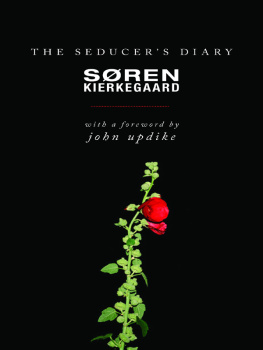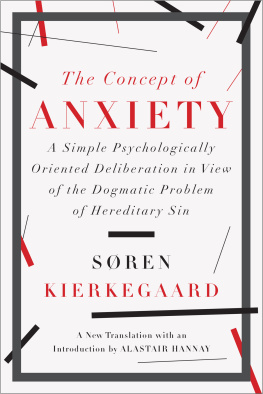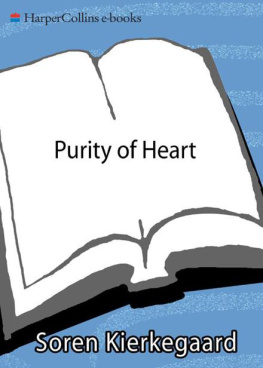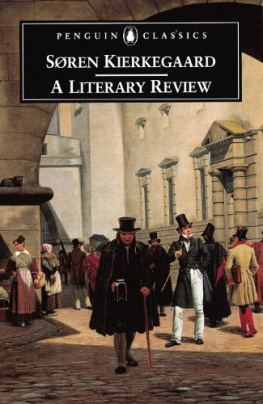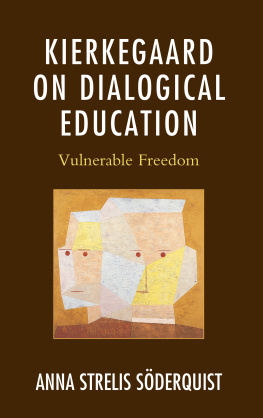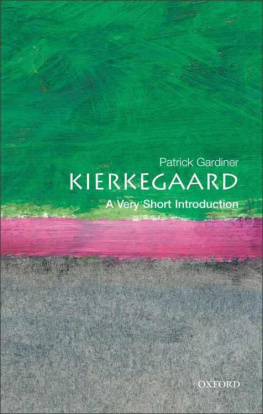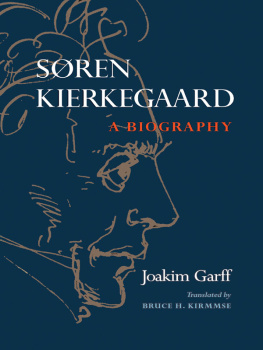Søren Kierkegaard - The Soul of Kierkegaard: Selections from His Journals
Here you can read online Søren Kierkegaard - The Soul of Kierkegaard: Selections from His Journals full text of the book (entire story) in english for free. Download pdf and epub, get meaning, cover and reviews about this ebook. year: 2012, publisher: Dover Publications, genre: Science. Description of the work, (preface) as well as reviews are available. Best literature library LitArk.com created for fans of good reading and offers a wide selection of genres:
Romance novel
Science fiction
Adventure
Detective
Science
History
Home and family
Prose
Art
Politics
Computer
Non-fiction
Religion
Business
Children
Humor
Choose a favorite category and find really read worthwhile books. Enjoy immersion in the world of imagination, feel the emotions of the characters or learn something new for yourself, make an fascinating discovery.
- Book:The Soul of Kierkegaard: Selections from His Journals
- Author:
- Publisher:Dover Publications
- Genre:
- Year:2012
- Rating:5 / 5
- Favourites:Add to favourites
- Your mark:
- 100
- 1
- 2
- 3
- 4
- 5
The Soul of Kierkegaard: Selections from His Journals: summary, description and annotation
We offer to read an annotation, description, summary or preface (depends on what the author of the book "The Soul of Kierkegaard: Selections from His Journals" wrote himself). If you haven't found the necessary information about the book — write in the comments, we will try to find it.
Kierkegaards journals reflect his further thoughts on the ideas developed in his philosophical and theological works, on his tumultuous career as an author, and on his own relationship with his work and readers. The primary source for any understanding of either the man or his thought. The Times (London) Literary Supplement.
The Soul of Kierkegaard: Selections from His Journals — read online for free the complete book (whole text) full work
Below is the text of the book, divided by pages. System saving the place of the last page read, allows you to conveniently read the book "The Soul of Kierkegaard: Selections from His Journals" online for free, without having to search again every time where you left off. Put a bookmark, and you can go to the page where you finished reading at any time.
Font size:
Interval:
Bookmark:
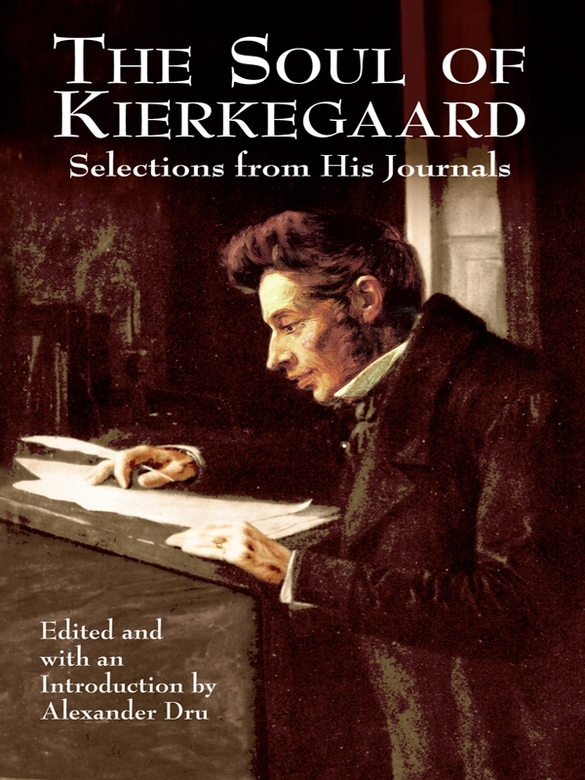
July 29. As one goes from the inn through Sortebro across the bare fields that run along the coast, about a mile and a quarter to the north one comes to the highest point in the district, to Gilbjerg. It has always been one of my favourite places. And as I stood there one quiet evening as the sea struck up its song with a deep and calm solemnity, whilst my eye met not a single sail on the vast expanse of water, and the sea set bounds to the heavens, and the heavens to the sea; whilst on the other side the busy noise of life subsided and the birds sang their evening prayerthe few that are dear to me came forth from their graves, or rather it seemed to me as though they had not died. I felt so content in their midst, I rested in their embrace, and it was as though I were out of the body, wafted with them into the ether aboveand the hoarse screech of the gulls reminded me that I stood alone, and everything vanished before my eyes, and I turned back with a heavy heart to mix in the busy world, yet without forgetting such blessed moments.I have often stood there and looked out upon my past life and upon the different surroundings which have exercised their power upon me; and the pettiness which is so often the cause of the numerous misunderstandings separating minds which if they properly understood one another would be bound together by indissoluble ties, vanished before my gaze. Seen thus in perspective only the broad and powerful outline showed, and I did not as so frequently happens to me lose myself in the moment, but saw everything as a whole and was strengthened to understand things differently, to admit how often I had blundered, and to forgive others.
As I stood there, without that feeling of dejection and despondency which makes me look upon myself as the enclitic of the men who usually surround me, and without that feeling of pride which makes me into the formative principle of a small circleas I stood there alone and forsaken, and the power of the sea and the battle of the elements reminded me of my own nothingness, and on the other hand the sure flight of the birds recalled the words spoken by Christ: Not a sparrow shall fall to the ground without your Father : then all at once I felt how great and how small I was; then did those two mighty forces, pride and humility, happily unite in friendship. Lucky is the man to whom that is possible at every moment of his life; in whose breast those two factors have not only come to an agreement but have joined hands and been weddeda marriage which is neither a mariage de convenance nor a msalliance but a tranquil marriage of love held in the most secret chamber of mans heart, in the holy of holies, where there are few witnesses but where everything proceeds before the eyes of Him who alone witnessed the marriage in the Garden of Edena marriage, which will not remain unfruitful but bears blessed fruits, as may be seen in the world by an experienced observer; for like cryptogams among plants, they withdraw from the notice of the masses and only the solitary inquirer discovers them and rejoices over his find. His life will flow on peacefully and quietly and he will neither drain the intoxicating cup of pride nor the bitter chalice of despair. He has found what the great philosopherwho by his calculations was able to destroy the enemys engines of wardesired, but did not find : that archimedean point from which he could lift the whole world, the point which for that very reason must lie outside the world, outside the limitations of time and space.
Gilleleie, August 1, 1835
What I really lack is to be clear in my mind what I am to do, not what I am to know, except in so far as a certain understanding must precede every action. The thing is to understand myself, to see what God really wishes me to do; the thing is to find a truth which is true for me, to find the idea for which I can live and die. What would be the use of discovering so-called objective truth, of working through all the systems of philosophy and of being able, if required, to review them all and show up the inconsistencies within each system;what good would it do me to be able to develop a theory of the state and combine all the details into a single whole, and so construct a world in which I did not live, but only held up to the view of others;what good would it do me to be able to explain the meaning of Christianity if it had no deeper significance for me and for my life ;what good would it do me if truth stood before me, cold and naked, not caring whether I recognised her or not, and producing in me a shudder of fear rather than a trusting devotion? I certainly do not deny that I still recognise an imperative of understanding and that through it one can work upon men, but it must be taken up into my life, and that is what I now recognise as the most important thing. That is what my soul longs after, as the African desert thirsts for water. That is what I lack, and that is why I am left standing like a man who has rented a house and gathered all the furniture and household things together, but has not yet found the beloved with whom to share the joys and sorrows of his life. But in order to find that idea, or better still, in order to find myself, it is no use throwing myself still further into life. And that is just what I have done hitherto. That is why I thought it would be a good thing to throw myself into the study of the law so as to develop my sharpness of mind in the complications of life. Here was a great mass of detail in which I could lose myself; here perhaps I might be able to work out a complete whole from given facts, an organum of theft, following up its darker side (and here a certain spirit of association is also extremely remarkable). I therefore wanted to be a barrister so that by putting myself in another mans role I could, as it were, find a substitute for my own life, and find distraction in outward change. That was what I lacked in order to be able to lead a complete human life and not merely one of the understanding, so that I should not, in consequence, base the development of my thought upon well, upon something that is called objectivesomething that is in any case not my own, but upon something which grows together with the deepest roots of my life, through which I am so to speak, grafted upon the divine, hold fast to it, even though the whole world fell apart. That is what I lack and that is what I am striving after.
It is the divine side of man, his inward action which means everything, not a mass of information; for that will certainly follow and then all that knowledge will not be a chance assemblage, or a succession of details, without system and without a focusing point. I too have certainly looked for such a centre. I have looked in vain for an anchorage in the boundless sea of pleasure and in the depth of understanding; I have felt the almost irresistible power with which one pleasure reaches out its hand to the next; I have felt the sort of meretricious ecstasy that it is capable of producing, but also the ennui and the distracted state of mind that succeeds it. I have tasted the fruit of the tree of knowledge, and often delighted in its taste. But the pleasure did not outlast the moment of understanding and left no profound mark upon me. It seems as though I had not drunk from the cup of wisdom, but had fallen into it. I have searched with resignation for the principle of my life, by trying to believe that since all things proceeded according to unalterable laws things could not be otherwise and by dulling my ambition and the antennae of my vanity. And because I could not adapt everything to my own mind I withdrew, conscious of my own ability, rather like a worn out parson resigning with a pension. What did I find? Not my Self, which was what I was looking for (thinking of my soul, if I may so express it, as shut in a box with a spring-lock which external circumstances, by pressing upon the lock, were to open).And so the first thing to be decided, was the seeking and finding of the Kingdom of Heaven. But just as a heavenly body, if we imagine it in the process of constituting itself, would not first of all determine how great its surface was to be and about which other body it was to move, but would first of all allow the centripetal and centrifugal forces to harmonise its existence, and then let the rest take its coursesimilarly, it is useless for a man to determine first of all the outside and afterwards fundamentals. One must know oneself before knowing anything else ( o ). It is only after a man has thus understood himself inwardly, and has thus seen his way, that life acquires peace and significance; only then is he rid of that tiresome, ill-omened fellow-traveller, the irony of life, which shows itself in the sphere of understanding, bidding true understanding begin with ignorance (Socrates) like God creating the world out of nothing.
Font size:
Interval:
Bookmark:
Similar books «The Soul of Kierkegaard: Selections from His Journals»
Look at similar books to The Soul of Kierkegaard: Selections from His Journals. We have selected literature similar in name and meaning in the hope of providing readers with more options to find new, interesting, not yet read works.
Discussion, reviews of the book The Soul of Kierkegaard: Selections from His Journals and just readers' own opinions. Leave your comments, write what you think about the work, its meaning or the main characters. Specify what exactly you liked and what you didn't like, and why you think so.


